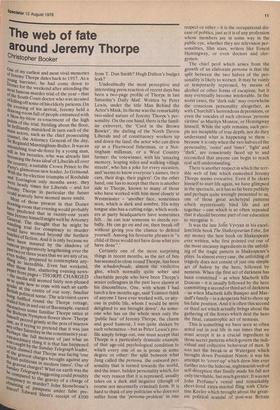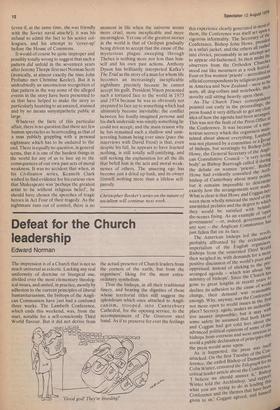The web of fate around Jeremy Thorpe
Christopher Booker °11e of my earliest and most vivid memories et, Jeremy Thorpe dates back to 1957. Asa Young barrister, he had come down to borset for the weekend after attending the Most famous murder trial of the year — that of the South Coast doctor who was accused of killing off some of his elderly patients. On the evening of his arrival, Jeremy helda dra,win--room full of people entranced with a °low-by-blow re-enactment of the high
he of the trial. Striding about the floor, tie brilliantly mimicked in turn each of the Main actors, such as the chief prosecuting
ec,°ansel, the Attorney General of the day, °II' Reginald Manningham-Buller. It was an astonishing tour-de-force by a young man, still in his twenties, who was already fast L'ecorning the beau ideal of Liberals all over the eftritry, a suitable Crown Prince to the D artY's glamorous new leader, Jo Grimond. With the by-election triumphs of Rochdale and Torrington only months away, they were heady times for Liberals — and for Jerenr. y Thorpe in particular the future could scarcely have seemed more sunlit. Most of those present in that Dorset ,ag. room that evening would probably :."ve predicted that in twenty-one years tittlie Jeremy himself might well be Attorney General. The thought that he might be standing trial for conspiracy to murder !Quid have seemed beyond the furthest 'Leaches of fiction. And it is only because we rumour been innured by the shadows of u nt3ar progressively lengthening over the Past two or three years that we are any of us, ethy.en today, prepared to contemplate anyafN so incredible. Even last weekend, 'ter those first, shattering evening newsPa e r front pages —THORPE CHARGED tue media still seemed fairly non-plussed to quite how to cope with such an earth94 k e at the centre of our cosy, familiar LiBritish Political scene. The television crews en. g baffled round the Thorpe cottage, ;ailed him in and out of Barnstaple, earned the m.elvesho Thorpe some familiar Thor satire at
13
Ps Nympton flower show. Thorpe iLislisea Peered grimly at the pots of marrow , as if trying to pretend that it was just gpaY other Saturday in the constituency year. eatraordinary
Perhaps the full measure of just what an
w thing it is that has happened s. caught by the Sunday Telegraph leader, wrhich claimed that Thorpe was facing 'one Trthe gravest charges brought against any ! lush politician in modern times'. One of tc,ne gravest charges? "Liinday What on earth was the Telegraph suggesting could possibly re. cont. pared to the gravity of a charge of '._?Ilspir.acy to murder? John Stonehouse's En6 of passports under false pretences) Edward Short's receipt of £500
from T. Dan Smith? Hugh Dalton's budget leak?
Undoubtedly the most perceptive and interesting press reaction of recent days has been a two-page profile of Thorpe in last Saturday's Daily Mail. Written by Peter Lewis, under the title Man Behind the Actor's Mask, its theme was the remarkably two-sided nature of Jeremy Thorpe's personality. On the one hand, there is the familiar extrovert, the 'Card in the Brown Bowler', the darling of the North Devon Liberals -and of constituency workers up and down the land: the actor who can dress up as a Fleetwood fisherman, or a Nottingham milkman, or a West Country farmer: the votewinner, with his 'amazing memory, leaping stiles and walking village streets', who has a joke for every occasion, and 'seems to know everyone's names, their cars, their dogs, their piglets'. On the other hand, one has to accept that there is another side to Thorpe, known to many of those who have worked with him most closely at Westminster — 'another face, sometimes seen, which is dark and sombre. His witty tongue also has a cutting edge, which workers at party headquarters have sometimes felt. . .he can tear someone to shreds verbally. He can go on and on, then break off without giving you the chance to defend yourself. Among his favourite phrases is "a child of three would not have done what you have done".'
Certainly one of the more surprising things in recent months, as the net of fate has seemed to close round Thorpe, has been the schadenfreude, almost the vindictive glee, which normally quite sober and charitable people who have been Thorpe's senior colleagues in the past have shown at his discomfiture. One, with whom I had lunch a few months ago, said 'I cannot think of anyone I have ever worked with, or anyone in public life, whom I would be more delighted to see brought down'. As someone who has on the whole seen only the 'public face' of Jeremy Thorpe, the charm and good humour, I was quite shaken by such vehemence — but as Peter Lewis's profile amply brings out, one must accept that Thorpe is a particularly dramatic example
of that age-old psychological condition to which every one of us is prone in some degree or other: the split between what
Jung called the persona, the outward personality that is turned towards the world,
and the inner, hidden personality which, for the very reason that it is repressed, usually takes on a dark and negative (though of course not necessarily criminal) form. It is hard to think of any politician who does not suffer from the 'persona-problem' in one respect or other — it is the occupational disease of politics, just as it is of any profession whose members are in some way in the public eye, whether they are television personalities, film stars, writers like Ernest Hemingway, or even doctors and clergymen.
The chief peril which arises from the growth of an elaborate persona is that the split between the two halves of the personality is likely to worsen. It may be vainly or temporarily repressed, by means of alcohol or other forms of escapism, but it may eventually become intolerable. In the worst cases, the 'dark side' may overwhelm the conscious personality altogether, as with Churchill's horrendous depressions, or even the suicides of such obvious 'persona victims' as Marilyn Monroe, or Hemingway himself. While the split remains, such people are incaphble of true depth, nor do they understand what is happening to them — because it is only when the two halves of the personality, 'outer' and 'inner', 'light' and 'dark', are consciously faced up to and reconciled that anyone can begin to reach real self-understanding.
There is another respect in which the terrible web of fate which enmeshed Jeremy Thorpe seems evocative. Even if he clears himself to start life again, we have glimpsed in the spectacle, as it has so far been publicly and perhaps quite wrongly presented to us, one of those great archetypal patterns which mysteriously bind life and art together — one which is so often repeated that it should become part of our education to recognise it.
It was the late John Vyvyan in his excellent little book The Shakespearian Ethic, for my money the best book on Shakespeare ever written, who first pointed out one of the most uncanny ingredients in the unfolding of the tragic pattern in Shakespeare's plays. In almost every case, the unfolding of tragedy does not consist of just one simple act of hubris by the hero, followed by
nemesis. When the first act of darkness has been committed — as when Macbeth kills Duncan — it is usually followed by the hero committing a second or third act of darkness — as when Macbeth kills Banquo and Mac duffs family —in a desperate bid to shore up his false position. And it is often this second or third act which actually brings about the gathering of the forces whith deal the hero the final, catastrophic act of nemesis. This is something we have seen so often acted out in real life in our times that we must accept it as a crucial ingredient in those secret patterns which govern the individual and collective behaviour of men. It
was not the break-in at Watergate which
brought down President Nixon; it was his attempt to 'cover-up' which drew him ever further into the hideous, nightmarish web of self-deception that finally made his fall not only inevitable, but much greater. It was not John Profumo's venial and remarkably short-lived extra-marital fling with Christine Keeler which brought about the greatest political scandal of post-war Britain
(even if, at the same time, she was friendly with the Soviet naval attache); it was his refusal to admit the fact to his senior colleagues, and his attempt to 'cover-up' before the House of Commons.
It would of course be quite improper and possibly totally wrong to suggest that such a pattern did unfold in the seventeen years after Jeremy Thorpe first met Norman Scott (ironically, at almost exactly the time John Profumo met Christine Keeler). But it is undoubtedly an unconscious recognition of that pattern in the way some of the alleged events in the story have been presented to us that have helped to make the story so particularly haunting to an amazed, stunned and by no means unsympathetic public at large.
Whatever the facts of this particular affair, there is no question that there are few human spectacles so heartrending as that of a man publicly grappling with a personal nightmare which has to be endured to the end. There is equally no question, in general terms, that it is one of the hardest things in the world for any of us to face up to the consequences of our own past acts of moral weakness. It was no accident that when, in his Civilisation series, Kenneth Clark wished to find evidence for his curious view that Shakespeare was 'perhaps the greatest artist to be without religious belief, he should have chosen the speeches of tragic heroes in Act Four of their tragedy. As the nightmare runs out of control, there is no moment in life when the universe seems more cruel, more inexplicable and more meaningless. Yet one of the greatest stories in the world is that of Oedipus gradually being driven to accept that the cause of the mysterious plague sweeping through Thebes is nothing more nor less than himself and his own past actions. Anthony Dyson has brilliantly interpreted Kafka's The Trial as the story of a man for whom life becomes an increasingly inexplicable nightinare precisely because he cannot accept his guilt. President Nixon presented such a tortured face to the world in 1973 and 1974 because he was so obviously not prepared to face up to something which had ultimately become inevitable: the conflict between his fondly-imagined persona and his dark underside was simply something he could not accept; and the main reason why he has remained such a shallow and uninteresting human being ever since (pace the interviews with David Frost) is that, even despite his fall, he appears to have learned nothing, is still totally self-justifying, and still seeking the explanation for all the ills that befell him in the acts and moral weaknesses of others. The unseeing ego has become just a dried up husk, and its owner himself nothing more than a lifeless selfparody.
Christopher Booker's series on the nature of socialism will continue next week.































 Previous page
Previous page